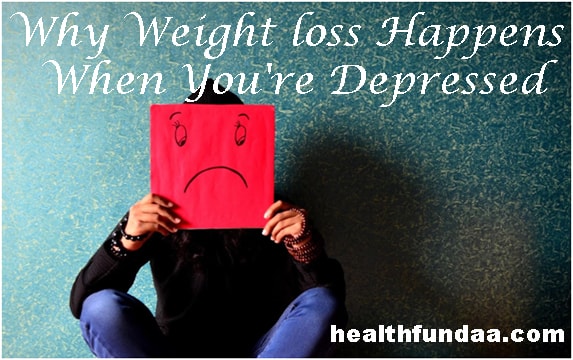Although depression is most often associated with sadness and a low mood, it includes other symptoms. One such symptom is a change in body weight or weight loss; often, people find themselves losing weight when depressed. While it is impossible to predict if this will happen, we can examine some of the reasons why it does.
Why Weight loss Happens When You’re Depressed
There are many reasons for weight loss when you are depressed. Lets have a look at some of them.
1. Lack of Appetite
Perhaps the most obvious explanation for depressive weight loss could be from a loss of appetite. One of the documented symptoms of depression is a sudden lack of appetite lack of appetite. If one’s overall activity level remains the same, this decrease in calorie intake invariably leads to weight loss. This can compound matters if it goes on for too long, as the body can start to digest muscle tissue. Furthermore, while starving, one’s metabolism slows, which can increase the risk of weight gain when one resumes eating.
2. Nervous Movement
Often, depression and anxiety go together. In cases like these, people who suffer from depression find themselves moving around more often. For example, they can develop twitches or shakes, or they pace around home excessively. This results in more physical activity than normal, which burns extra calories, and thus leads to weight loss.
3. Metabolic Gear-Shift
If anxiety presents with depression, it can affect weight in another way. In acute anxiety, the stress response—fight-or-flight—is triggered, releasing stress hormones, such as cortisol. Over a short period of time, these can “rev” the body’s metabolism, increasing its energy requirement. This causes the body to burn more calories, leading to weight loss. One should keep in mind that this is true only for short-term anxiety. If anxiety persists over a long term, these stress hormones can contribute to a gain in weight.
4. Over-managing Anxiety?
When anxiety manifests, people try several methods to manage it. These could include exercising and adopting healthier eating habits. Though these are aimed at controlling anxiety, they can have the unexpected result of weight loss. On its own, this kind of weight loss may not be problematic, if it is managed well. A risk with these kinds of coping strategies is that they can be overdone, and people can lose weight too quickly. Furthermore, these strategies can cause people to become worried about their weight, increasing their anxiety, and creating a vicious cycle.
5. Disorder in Disguise
When in the middle of depression, it can be easy to assume it is causing any weight loss. People should be aware, however, that the symptoms of depression can mask other disorders. In cases with sudden weight loss, the prime suspects would be bulimia nervosa and anorexia nervosa. Both can also present depressive symptoms, making them easy to mistake for depression. If one suspects they have an eating disorder, there are some telltale signs. In anorexia, some defining features are an abnormally low body weight and an extremely thin appearance. Conversely, those who suffer from bulimia have an average or above-average weight. It is the cycle of bingeing and purging—overeating and then ridding oneself of excess calories—that tells the tale. In any case, if one believes they have an eating disorder, one should seek help immediately. Conditions like anorexia and bulimia are very pervasive and can cause severe damage if untreated.
6. Lifestyle Adjustments
During a depressive episode, people can find themselves making changes to their lifestyle. When feeling a lack of pleasure, people can avoid their favorite activities. If they feel too anxious, they refrain from going out with friends. Depending on what changes people experience, this can cause weight loss. If people that used to go out drinking stop going, they no longer take in calories from alcohol. Weightlifters and bodybuilders who lose interest in weight training can experience atrophy, effectively decreasing their weight. In dealing with depression-related weight loss, one’s responses can be just as important as the symptoms.
7. Difficult to Digest
When depression fully manifests, digestive problems can be another symptom. This can also contribute to weight loss. During times of stress—or excess anxiety—the body’s ability to absorb nutrients from food can be affected. If a person is experiencing depression-related anxiety, they may have trouble extracting nourishment from food. As a result, even if a person’s eating and activities remain the same, they lose weight. This illustrates why it is important to be aware of any physical symptoms of depression. If such a condition is left unchecked, one can be at risk for additional complications.
In summary, there are many explanations to why depression can cause weight loss. The most important thing is for a person to be aware of their symptoms. In some cases, patients have some control over what affects their weight. Other times, however, patients may need medical assistance. By remaining aware of how depression manifests, one can have a better idea of what to do.










There are numerous clarifications to why depression can cause weight loss.
Right Cynthia!
Hi Sonal,
Very informative post. I’ve been depressed in the past and it’s true you lose a bit of weight. Thanks for explaining the reasons for it.
Adithya Shetty recently posted…How to Start a Minimalist Blog With WordPress
Hi Adithya
thanks for stopping by and sharing your views.
Have a nice day!
Hii Sonal
I very well explained article I lost 20 kg wait while my Board Exam.
That Time I realize what stress can do.
Hi Manoj
Glad that you liked the post. but I would like to say that do not stress yourself even during the exams. Keep a relaxed mind.